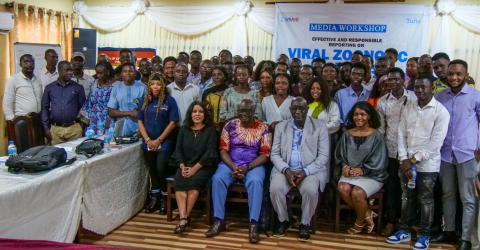By Chernor Alimamy Kamara
In order to mitigate the outbreak and spread of diseases that endanger the health of the people, over 60 journalists have been trained to provide timely and accurate information regarding public health emergencies.
The training which was facilitated by Politico and supported by Internews through the Stop Spillover project, working to address the spillover of Zoonotic diseases in Sierra Leone commenced on the 28th of August, 2023 at the Council of Churches in Sierra Leone (CCSL) Conference hall in Freetown.
In his presentation on Communication in Public Health Emergencies and the Risk Factors, the Risk Communication and Public Health Emergency Lead in the Ministry of Health, Harold Thomas noted that a public health emergency could be caused by diseases, disasters, accidents, or intentional acts. He said such emergencies require prompt and coordinated actions from public health authorities and various organizations in order to protect people’s health and safety.
He urged Journalists to provide timely and accurate information regarding public health emergencies and that they help reduce misinformation and panic by mobilizing public response and cooperation.
He highlighted strategies to mitigate communication risk which include establishing clear communication channels, providing information in multiple languages, collaborating with media and social media platforms, fact-checking and countering misinformation, and conducting drills and training for effective communication. He noted the importance of involving communities in communication strategies thereby building trust and credibility, utilizing community leaders and influencers.
In his keynote address, Professor Aiah Gbakima who is a Medical Research Scientist noted that viral diseases are national security issues that should be treated with utmost seriousness and urgency. He talked about how Lassa fever is transmitted through contact with the fluids of a patient who could have interacted with a rodent.
He called on journalists to be culturally sensitive in reporting the Spillovers of zoonotic diseases so that people would not be panicked. He urged everyone to minimize deforestation and mining activities as he said it would expose harmful animals to society. He encouraged journalists to investigate zoonotic disease stories and analyze them.
Zoonotic diseases are infections that are spread between animals and people. They are responsible for most infectious diseases according to the US Center for Disease Control. Ebola, Lassa fever and COVID-19 outbreaks in Sierra Leone are clear indications of the dreadful nature of zoonotic diseases and why they should be given utmost care and attention in a bid to curtail their spread and by extension prevent the emergence of such new pathogens in the country and the world at large.
Journalists and media organizations are no doubt well-positioned to make this possible. However, they are often limited by factors such as the lack of information and accurate data, and the expertise to interpret them resulting in reports that are not informative enough and at times, lack accuracy. It is in that regard that journalists across the country were brought together to effectively report on zoonotic diseases and the threats of their spillover with a One Health approach.
Copyright © 2023 Politico (30/08/23)








